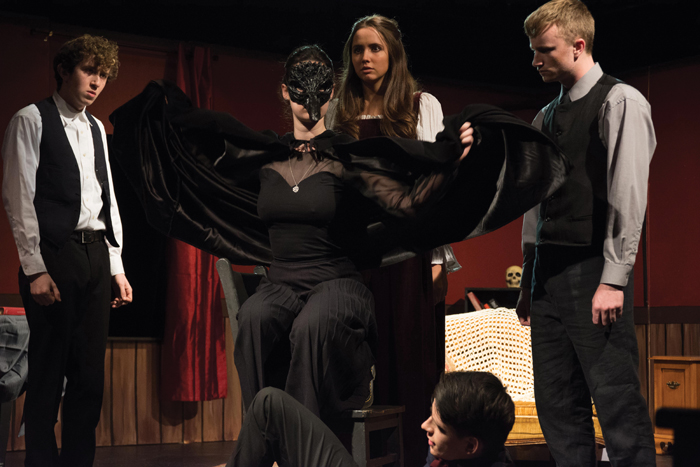Players’ Theatre is an independent group at McGill, run entirely by undergraduate students. Nightfall, their first production of the 2017-2018 season is a theatrical adaptation of four tales by Edgar Allan Poe: The Raven, The Fall of the House of Usher, The Pit and the Pendulum, and The Tell-Tale Heart. The play takes us into the mind of Poe and, through a continuous, vignette-style adaptation, explores the meaning and meeting of madness and genius. An engaging and ambitious revisioning of Poe’s works, Nightfall provides strong performances, and—although suffering from somewhat unpolished audio production—serves as a haunting tour of Poe’s fraught inner workings.
Director Kenzia Dalie’s adaptation is one continuous act with no intermission and only small set changes separating the four storylines. The first story, The Raven, depicts Edgar Allen Poe as he sits in his study, trying to forget his lost love, Lenore. The appearance of a raven at his window drives Poe mad as he repeatedly asks the raven painful and personal questions—questions to which the raven only responds, “Nevermore.” In The Fall of the House of Usher, an unnamed man returns to the home of a boyhood friend, Roderick Usher, only to find that the house and its inhabitants are hiding sinister secrets. The Pit and the Pendulum is a first-person narration of a man who finds himself trapped in a prison and has to escape a series of torturous devices. Finally, The Tell-Tale Heart provides a story of paranoia and mental deterioration as Poe himself tells the story of how he murdered an old man.
Luke Horton delivers a haunting performance as Poe in the opening and closing stories. Matthew Milton, Oliver Epstein, Esme Thompson, Emma Barbisan, and Stanley Myers O’Mulloy round out the dynamic cast. The actors play multiple roles, giving the production an intimate feel and allowing each actor to develop a more prominent presence on stage. This directorial decision to keep the cast small pays off, as Nightfall’s strength lies primarily in its actors’ performances.
The opening tale, The Raven, serves as an introductory piece into the mind of Poe. The dialogue is split between cast members, creating a seamless shared narrative. Horton’s Poe captivatingly delivers some of the most poignant lines in the poem. With sunken eyes and lifeless stares, he dominates the stage and convincingly captures the poet’s mania. Perfectly rehearsed dialogue from Epstein, Thompson, and Milton, who all play unnamed characters, create a fluid narrative that is wonderfully eerie to watch.
Interestingly, the raven of the poem is played by an actor (Emma Barbisan). Although the avine personification is initially intriguing, its presence at times distracts from the rest of the characters on stage. The raven only repeats a single word of dialogue a handful of times, rendering its large physical presence on stage somewhat at odds with its limited vocabulary.
The subsequent three tales provide a similar combination of horror and suspense. However, tense moments were periodically interrupted by technical shortcomings. Set changes, although necessary, felt unpolished and lighting and sound cues were not always precise. Sound effects were also an issue, most notably in the third piece, The Pit and the Pendulum. Nightfall chooses to use voice over in its adaptation of the story, rather than a live performance of the dialogue—a technical choice which doesn’t quite live up to its potential. Myers O’Mulloy gives a strong speechless performance as the prisoner, yet the unpolished and uneven recording feels like a jarring modern insertion in an otherwise antique world.
Sarah Alevy’s set is well utilized and appropriately versatile, with a singular old-fashioned living space serving as the setting for three out of the four pieces (The Pit and Pendulum is set downstage and uses only a single chair). Costume designer Allie McGowan also stands out with her use of old-fashioned formal wear, invoking a distinctly Victorian aura.
Nightfall, despite a few technical shortcomings, is a unique adaptation of literary classics. With compelling performances and haunting characters, it presents an appropriately disturbing examination of a poet’s descent into madness—a fitting performance for the Halloween season.
Nightfall runs from Oct. 18-28 at Players’ Theatre, 3rd floor SSMU. Tickets are $6 for students and $10 for general admission. Tickets can be reserved online or purchased at the door.








